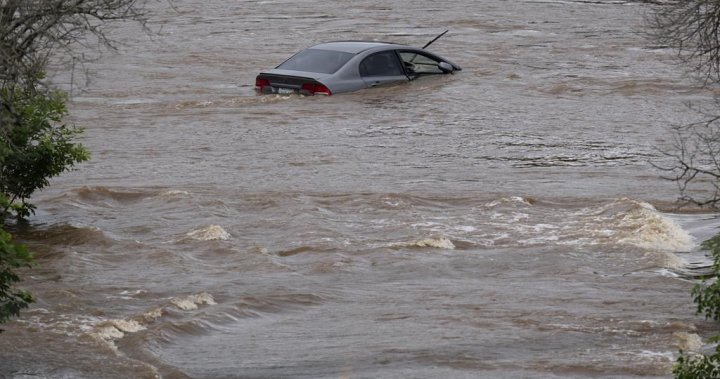
Climate change: Correlation between wildfires, flooding in Nova Scotia
Global News
The fingerprints of climate change are all over the supercharged weather witnessed this year in Nova Scotia, from raging wildfires to devastating flooding.
The fingerprints of climate change are all over the supercharged weather witnessed this year in Nova Scotia — and the rest of the country — from raging wildfires to devastating flooding.
A series of punishing thunderstorms dumped up to 250 millimetres of rain on Nova Scotia this weekend, killing at least two people and damaging infrastructure across the province.
About two months ago, nearly 250 square kilometres of land was scorched by record wildfires. The province is also experiencing summer temperatures that are warmer than usual.
There is a correlation between rising temperatures, wildfires and heavier rainfall, said Kent Moore, an atmospheric physics professor at the University of Toronto.
Rising temperatures lead to drier conditions, increasing the risk of wildfires, he said, but the warmer weather also augments the atmosphere’s ability to hold moisture, leading to heavier downpours that can cause flooding.
Four people, including two children, were reported missing Saturday when the two vehicles they were travelling in were submerged in water northwest of Halifax. RCMP on Monday said they recovered the body of a 52-year-old man from Windsor, N.S., in the main search area northwest of Halifax, while the second person’s remains were found “by civilians” on shore in a tidal area in the neighbouring county.
The heavy rain left behind a trail of 25 damaged or destroyed bridges, and about 50 wrecked roads.
Nova Scotia is about two degrees warmer than usual for this time of the year, Moore said. And as Nova Scotia and the rest of the planet heat up, the atmosphere’s ability to hold water vapour increases, he added.





















 Run 3 Space | Play Space Running Game
Run 3 Space | Play Space Running Game Traffic Jam 3D | Online Racing Game
Traffic Jam 3D | Online Racing Game Duck Hunt | Play Old Classic Game
Duck Hunt | Play Old Classic Game











